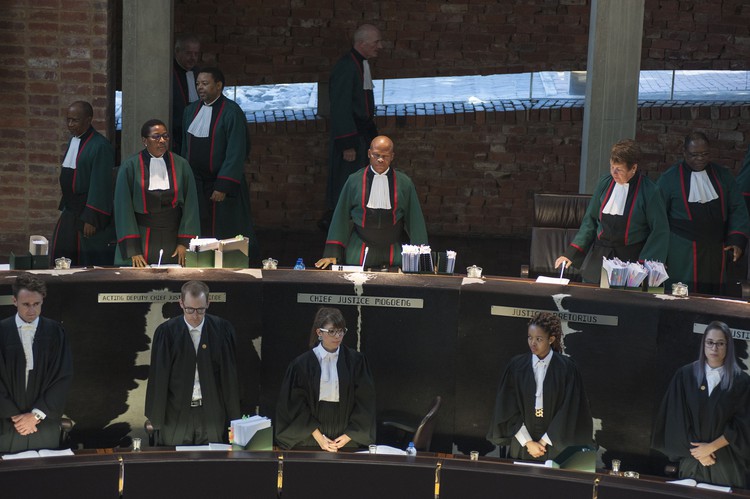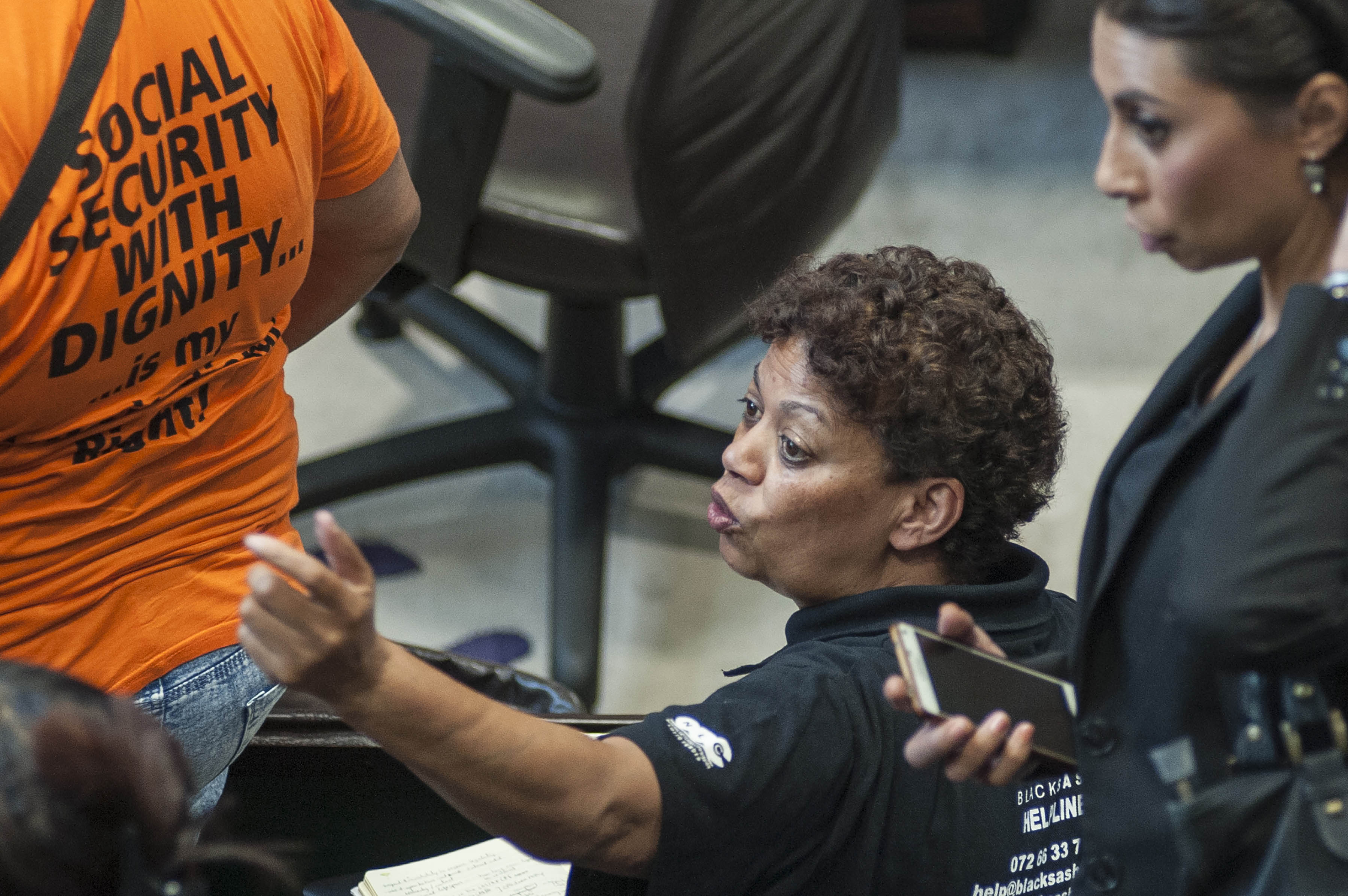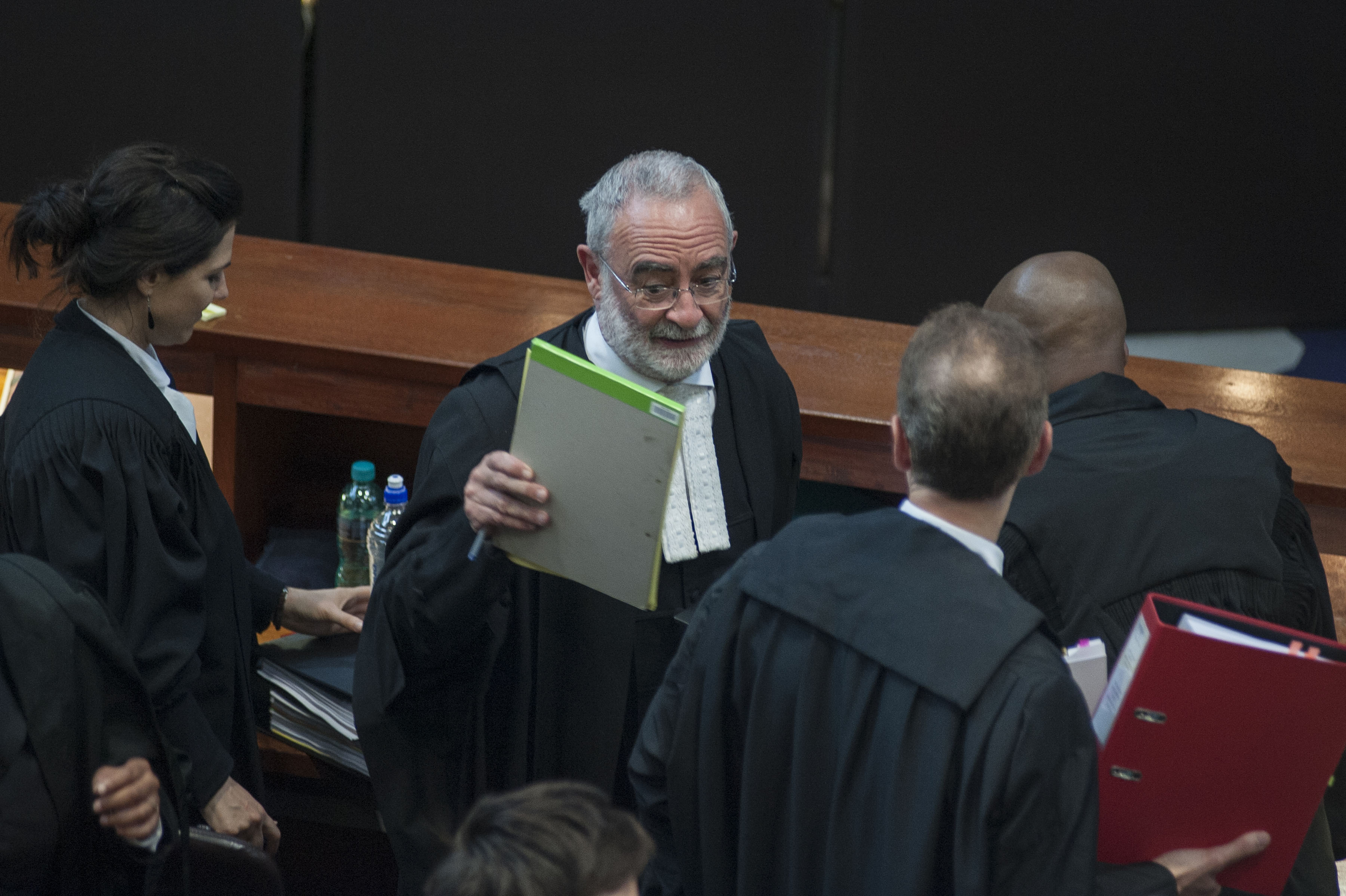
A full bench of the Constitutional Court heard the application by the Black Sash on social grants on Wednesday. Photo: Ihsaan Haffejee
15 March 2017
The Constitutional Court will not write Cash Paymaster Services (CPS) a “blank cheque” to pay out social grants to 17 million beneficiaries, lawyers for CPS were told on Wednesday.
Judge Phineas Mojapelo said the Court would not authorise a contract it had not seen.
He was responding to arguments from advocate Alfred Cockrell, representing CPS, during the hearing on 15 March of an application by the Black Sash for the Court to take back oversight of the social grants payment contract when the current contract between the S A Social Security Agency (SASSA) and CPS comes to an end on 31 March. The Black Sash has also asked the Court to make sure the personal information of beneficiaries is protected in any new deal with CPS.
A full bench of justices heard the case that will decide the immediate future of the social grants payment system. Judgment was reserved.

“This is a crisis,” Chief Justice Mogoeng Mogoeng said. “We must do whatever is necessary to intervene to stop the proliferation of this crisis.”
Cockrell argued that the Court should allow CPS and SASSA to negotiate an interim contract. CPS accepted its “constitutional obligations” and did not intend to “walk away” from its obligations, Cockrell said, but the company needed a contract in order to pay out the grants from 1 April. CPS accepted the need to act “reasonably” in negotiating the contract, he said.
The judges questioned Cockrell about a letter from CPS to SASSA in December in which the company had asked for a fee increase in line with inflation over a two-year contract. Cockrell said the new fees would be charged as a lump sum rather than as a fee per beneficiary. The current fee per beneficiary paid is R16.44.
“Your client wants more money?” asked Chief Justice Mogoeng. CPS needed to charge a lump sum, Cockrell said, because the number of beneficiaries would decrease as the system was gradually transferred to SASSA or another contractor.
Asked by Chief Justice Mogoeng why it could cost CPS the same amount of money to pay out the social grants if the number of beneficiaries decreased, Cockrell said: “The infrastructure is the same”.
He acknowledged that he did not have all the information on the fees but promised to provide it to the Court.
Cockrell dismissed arguments by Freedom Under Law that CPS should pay back profits from any new contract, in line with the Court’s earlier ruling that CPS could not benefit from an unlawful contract. The new contract would be lawful, Cockrell said, so Freedom Under Law’s argument “had no traction”.
For the Black Sash, advocate Geoff Budlender asked why, if CPS was to taper off its services, it should charge the same lump sum per month for fewer services rendered.
Rather than a new contract, Budlender asked the Court either to order an extension of the current contract, or to order SASSA and CPS to continue to carry out their constitutional obligations. He said if CPS wanted to increase its fees, it should be told to approach the Court for permission to do so.
Earlier, counsel for SASSA and Social Development Minister Bathabile Dlamini, advocate Andrew Breitenbach, had been closely questioned on the Minister’s failure to inform the Court that SASSA would not be able to take over the grant payments as planned on 1 April.
“It is embarrassing,” Chief Justice Mogoeng said. There had been “no word of apology” from the Minister, he said.
“No one is standing ready to pay benefits to beneficiaries,” Chief Justice Mogoeng continued. “Why is that?” He said SASSA and the Minister of Social Development were “absolutely incompetent.”
Counsel for the South African Post Office (SAPO), advocate Aslam Bava, argued that the Post Office could take over payments in a month. The Post Office already managed some 6 million bank accounts through Post Bank, and had the technical experience for the task, he said.

“As we stand here, no-one knows who will pay the grants after April 1,” said Budlender.
“Anyone who is not anxious about the situation that SASSA and the Minister have created is not paying attention.”
The executive, he said, had simply failed to carry out its duties and Parliament had failed “to give effective oversight”.
“The executive has failed. Parliament has failed. And that, I’m afraid, leaves the courts,” Budlender said. “The Court has to step in.”